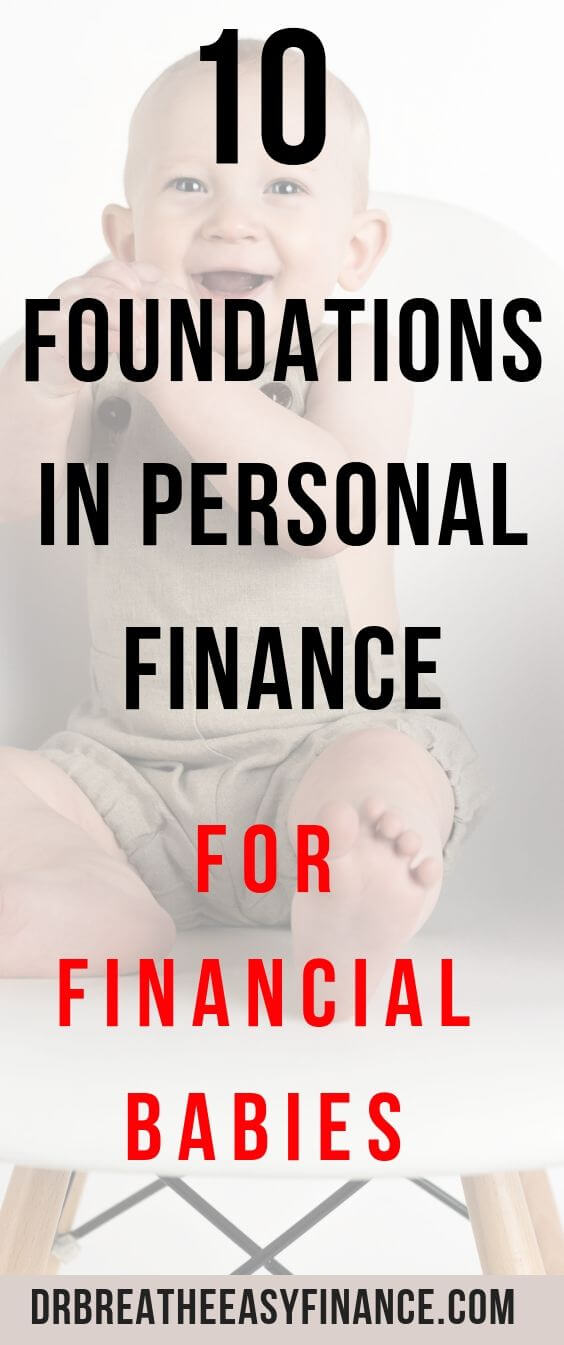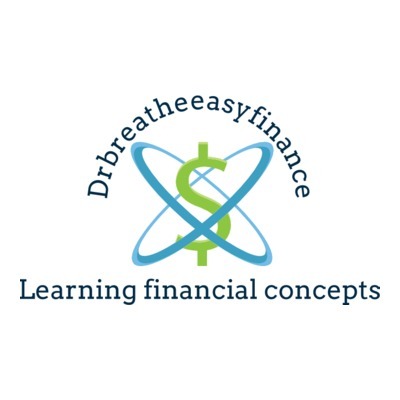The good news is that the laws of money never change. The bad news? Chances are that most people don’t understand the basic fundamental lessons of personal finance, and why they matter. Sure, you were taught in school how to balance a checkbook, what a checking account is and that we need to save money for the future. But did you ever learn why we have money, how it works and even what time value of money is? We have an awesome viral post on time value of money and future value of money to check out at your leisure.
These are all fundamental concepts to personal finance that will impact how you handle money and ultimately affect the future success (or, heaven forbid, failure) of your financial health. Want to get a head start to success with your personal finances? Here are 10 foundation lessons everyone should know to build a successful financial future.
This post is for the babies of personal finance. If you are a toddler, teenager or adult of personal finance, I am sure you will learn something also.

Table of Contents
10 Fundamental Foundations In Personal Finance
Having a basic understanding of these 10 fundamental lessons and foundations in personal finance will allow you to see the big picture financially. It will allow you to make better financial decisions, avoid common financial mistakes, and be among the few who actually make their money grow. Your money works for you instead of working for money.
1. Understand How Money Works
It sounds simple but this is an important foundation to understand. Money is simply a medium of exchange. That’s it. No more, no less. Don’t think of money as anything else.
It is important to have money if you want to acquire something. Don’t think of money as evil. Money is a nonliving thing. It is amoral.
Before money was ever invented, people would trade goods for goods. Farmers would buy and sell goods and services in exchange for other goods and services such as livestock and farming goods. In many cases, rare metals like gold, silver, and copper were used as a medium of exchange, allowing for one to buy goods and services in exchange for rare coins.
Today, we use paper money such as the US Dollar as a universal medium of exchange. When I go to the grocery store to purchase food, I can trade my earned money for goods and services. When I sell goods and services, I can sell them for paper money which serves as a universal storage unit of value until it is used to purchase or exchange for more goods and services.
We went in detail on our post on the 20 rules of money every entrepreneur needs to know.
2. Know How Taxes Work Instead Of Complaining About It
Another easy one before we dive deeper. It is very common in the personal finance community and the general population to label IRS as a monster or complains about paying taxes. I am not entirely innocent as my taxes are very high as a W2 employee and I do complain from time to time.
Taxes are payments to government entities that provide the financial means to support, grow and maintain public communities. Tax money is used to maintain roads, pay for government buildings and workers, pay for law enforcement, education, and other public services and operations.
We are taxed both on a state level (except few states), federal level, sometimes local too. Sales tax, property tax. and so on. Sometimes it feels endless.
The good news is the tax laws have different ways in which consumers can qualify for tax deductions and credits, meaning they can lower their taxes owed to the government for certain qualifying expenses.
Your tax professional who evaluates and prepares your taxes analyzes your income each year, calculates any qualified expenses that you can use to deduct from your taxes, and ensures you are compliant with current tax laws.
I do my own taxes currently, but as side gigs are expanding, I might get a tax professional too.
Taxes will most likely be one of the largest expenses you will ever have throughout your life, thus, learning the different ways you can pay less in taxes can be a great way to save a lot of money.
Taxes are necessary, but it is also smart to know and claim all the possible tax breaks you are entitled to.
As far as I am concerned, as long as everything is done legally, don’t feel bad for claiming all the deduction that is rightfully yours.
Taxes are necessary, but it is also smart to know and claim all the possible tax breaks you are entitled to. Share on X
3. Control Your Money Or It Will Control You
Perhaps one of the most important pieces of personal financial success is giving every dollar you earn a place to go. In other words, creating a budget and planning your finances is essential to determining where you will be in the future financially.
A budget is a simple account of how much money you have coming in for a given timeframe, and what expenses you have coming up to pay for basic living expenses. Your budget also includes discussing and planning for major purchases, future events and planning for retirement.
I know people that say they don’t need a budget, budgeting is just a training wheel and so on. In fact, we wrote a blog post on 10 downsides to budgeting in which we analyzed if budgeting is for amateurs or just a training wheel.
I will insist that everyone needs a form of budgeting to be financially successful. It might not be a full-blown penny-pinching type or elaborate excel sheet, but you need something. Even if is reverse budgeting.
What happens if you don’t have a budget? Your money is earned and the devil inside all of us, known as an impulse spender, will take over. Before you know it, you will run out of money with weeks left in the month. A budget is a financial plan on how and where your money will be spent and allows you to predict your financial future by following your plan.
Check out our detail post on how to make a budget to live the life you want. In that post, we discuss 10 reasons to budget, 8 steps to create a successful budget, 5 risks of not managing your money, 4 tools to manage your money including our free budget template and to finish off the awesomeness of the article, we discuss the money habits of millionaires from reputable sources.
4. How Debt, Loans & Interest Rates Work
Debt is lent money from a person or a bank, in exchange for a price of lending the money (aka the interest rate). Larger purchases such as buying a car or a home may be difficult to have enough money to pay for in cash. By requesting a loan from a bank, they will give you the money needed to make the large purchase, but it will have a repayment term and a cost of lending you the money, which is the interest rate.
You might request a $10,000 loan from a bank to buy a car, and they will lend you the money so long as you pay them back the full $10,000 plus a cost of 5% for example, or $500, for a total repayment of $10,500. Your loan repayment will divide the full $10,500 over an agreed timeframe, with a requirement to pay regular payments until the full amount plus the interest rate is paid off.
The lesson to learn here is to know how to juggle this properly. If you are savvy you might be able to use leverage to work in your favor. Use low-interest debt to invest or pay off high-interest debt.
Whatever you do, make sure the compound interest work in your favor and not against you. This is why we talk a lot about getting out of debt.
5. How To Get Out of Debt Fast
Just like not having a budget brings out our inner “impulse spender,” debt can often get the best of that same “impulse spender” resulting in us buying more products than we can afford. The consequence is accumulating large amounts of debt over time, that requires a large portion of our income each month being spent toward paying off our debt.
Learn how to live below your means in 7 easy steps in our actionable and motivational article on that topic.
A common way to pay off debt as fast as possible is known as the debt snowball. Simply list your debts from smallest to largest. Then make minimum payments on all the debts, except for the smallest debt balance. This way, you will throw as much money as possible until it is paid off. Once the smallest debt is paid, you then apply for the payments you were paying to the balance you just paid off to the next smallest debt until it’s paid off. Keep doing this until you have paid off all your debt in full. This is emotionally satisfying, that was the main reason Dave Ramsey advocates this in his 7 steps to financial freedom.
We recommend the avalanche method. In the debt avalanche method, you pay your debts from highest interest rate to lowest interest rate, regardless of balance. Mathematically this makes the most sense. You will pay less in interest if you tackle your debts in this order. Saving money on interest means you will pay your debts off more quickly – Excerpt from moneyunder30
Here is an awesome article to comparing snowball vs avalanche method. Your choice. We also touched base on our own 12 toddler steps to financial freedom.
6. Why & How To Save More Money
Saving money is often a difficult task, because, once again, our “impulse spender” inside of each of us wants to buy stuff and wants it now. However, the reality is that unexpected events occur, requiring unexpected expenses. Unless we have saved for these emergencies, often times debt is used instead, resulting in even more debt less financial freedom.
Reasons to save money are for unexpected emergencies, down payments on a home, to pay for education, plan for having children, plan for upcoming health expenses and perhaps most importantly to play for retirement. It’s a good practice to set your savings on autopilot by scheduling a regular automatic transfer with your bank to transfer a set amount of money on a regular basis to contribute to savings. That way you can “set it and forget it.”
Try out our 101 epic ways to save money. I am sure you will find some way you haven’t tried before.
7. Plan For Retirement
Unless we save money for retirement, you can expect to work until your old age. A proper plan for retirement takes sitting down and discussing how you wish to live in retirement. Calculate how much you feel comfortable living on, what age you plan to retire, and how much you will need in order to retire on your pre-determined retirement income.
After you have calculated how much you will need, start contributing to qualified retirement accounts such as a Traditional or Roth IRA or your employer 401k.
Why is it so important to start saving for retirement as soon as possible? Well, if you did the calculation on how much money you will need in order to retire, the answer to that question will be obvious. Otherwise, you can plan to work for your entire life, and who wants that?!
Here are our articles on retirement.
A helpful guide on everything you need to know about 401k
How long will it take to become a Roth IRA Millionaire
A quick review of the 2019 IRS changes to your retirement account you need to know
5 types of income the IRS wants you to know so you don’t miss a huge deduction
Retire at 42 with the cash flow plan and system of budgeting
8. The Magic of Compound Interest
Compound interest is said to be the “8th Wonder of the World” by many. What is compound interest? It’s when your money earns interest upon interest upon interest, etc. Let’s say you invest $10,000 in year one, and you receive a 10% return, earning you $1,000 for an ending balance of $11,000 ($10,000 invested + $1,000 return = $11,000). The following year has similar results, earning you 10% return again, except for this time it’s %10 of $11,000 rather than 10% of $10,000. Rather than earning $1,000 in year two, you earned $1,100.
Compound interest is the exponential growth of interest-earning interest upon interest. So what’s the lesson? Utilize the power of compound interest early on and invest early on and for the long term. The result will be mind-blowing over years of consistency and will make that ultimate retirement number much more attainable than you thought.
Did you know that if you started out with just $0.01 and doubled its value every day for 30 days, the ending value will be $10,737,418.20?! That’s the power of compound interest.
Did you know that if you started out with just $0.01 and doubled its value every day for 30 days, the ending value will be $10,737,418.20? Share on X
Try out our compound interest calculator to see when you will make your first million. It’s fun! trust me. It might be sooner than you think.
9. Your Most Important Asset
Your most important asset from a monetary standpoint is your income. The more money you make, the more power you have to save and build your wealth. Thus, building your income should always be a focus to improve your financial situation.
How can you build your income? First and foremost, take advantage of your time, talent and energy at your primary job. By rising to the top and contributing to your company, chances are you will quickly be promoted and even be given a raise for your hard work.
Next, look for ways to make extra money on the side. Many people make extra money working a part time job on the weekends, doing contracted work a few hours per week, selling old items in your house, doing freelance work online, and anything in between. Increasing your income can be the easiest and fastest way to improve almost any financial situation and accelerate your path to wealth.
The ultimate form of wealth, however, is to start developing a way to make passive income. You must be able to make money while you sleep or while sipping pina colada on the beach.
10. Create Good Money Habits Early On
The earlier you implement good money habits such as saving, paying off debt, and planning for retirement, the better off you will be and the more opportunity you will create for your future. Initially, cultivating new money habits may be difficult, but with time and conscious effort it will become a habit that takes no thought or effort at all. Next to growing your income as mentioned in the last step, time is your best friend to saving money, investing and building wealth.
I am a pulmonary and critical care doctor by day and personal finance blogger/debt slaying ninja by night.
After paying off close to $300,000 in student loan debt in less than 6 months into my real job, I started on a mission to help others achieve the same. There is no magic to this than to strap up and get it done. Some of the ways we achieved this include side hustle, budgeting, great negotiation skills, and geographical arbitrage.
When I was growing up, common knowledge in Nigeria is that there is one thing you cannot trust anyone else with, and you guessed it – your money.
Being frugal came easily to me based on my background. However, the concept of building wealth did not solidify in my mind until when I finished medical school. I wish I knew what I know now when I was 14. Still, I don’t know enough and I am constantly learning to improve my knowledge.
My goal is to reduce financial illiteracy among young professionals. I am catering to the beginners – babies and toddlers in financial literacy.








Leave a Reply